How student politics impacts the lives of students
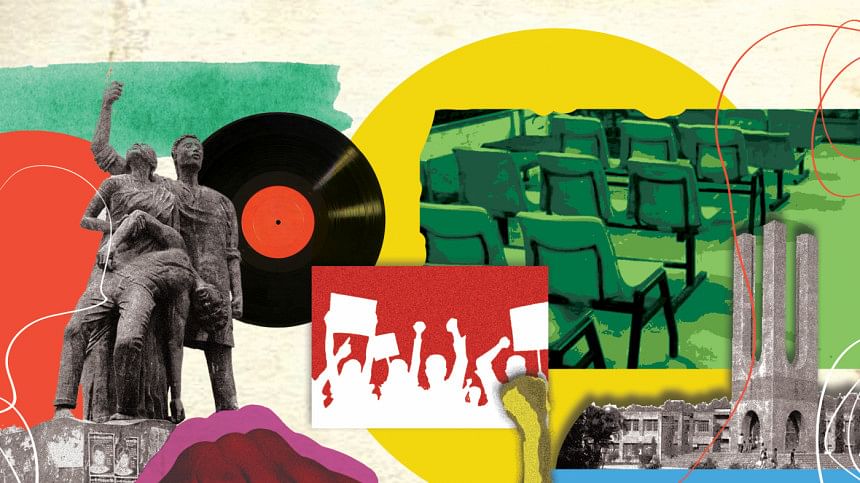
On October 6, 2019, the whole country was shaken to its core by the murder of Abrar Fahad, a second-year student at Bangladesh University of Engineering and Technology (BUET) at the hands of members of Bangladesh Chhatra League's (BCL) BUET wing and their followers. BCL, of course, condemned the incident and expelled the members involved. BUET has since banned student politics on their premises.
Yet, Abrar wasn't the first casualty of student politics in recent years. Just in BUET, in 2002, Sabekun Nahar Sony, a student of Chemical Engineering fell prey to the gunfire between two groups of BUET Chhatra Dal. In 2013, Arif Raihan Dwip, an undergraduate student of Mechanical Engineering was brutally hacked to death by a religious extremist. But that begs the question – in a country that owes its independence to its glorious history of student politics, is banning it the only feasible solution to circumvent its negative repercussions?
In many public universities, not being a part of student politics is often not an option. Hall seat allocations and other privileges are often available only for students taking part in student politics.
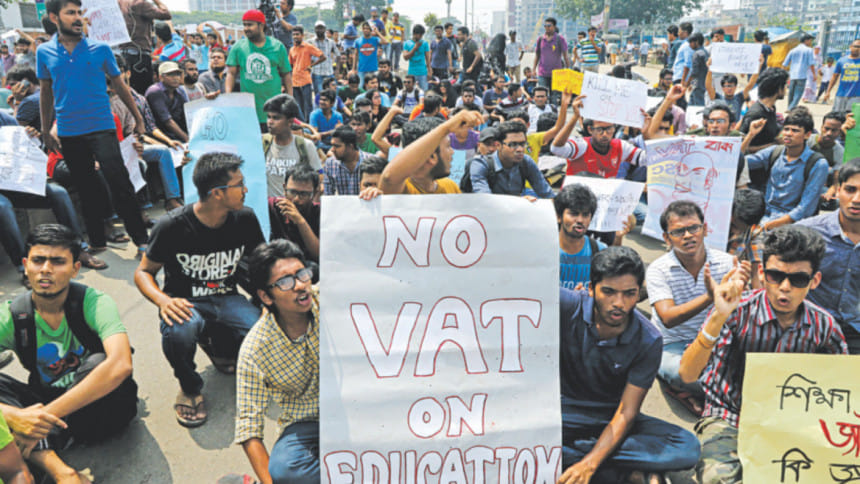
"When I first started living in the gonoroom (public room), I stayed there for two and a half months. Then the pandemic started and I left. When the seats were allotted politically, I didn't find my name on the list because I didn't participate in the programmes or guestroom activities and didn't lobby well with the big brothers," said Abir Ayon, a resident of Bijoy Ekattor Hall of Dhaka University. "I did end up getting a legal department seat in the Bijoy Ekattor Hall after a year. I just want merit-based seat allotment and it should be monitored by the university administration. After that, if students want to do politics, it should be up to them."
"I was ousted from my legal room and the students who occupied the room didn't come out even when the house tutors asked them to," said Arafat Rahman*, a resident of Haji Muhammad Mohsin Hall of Dhaka University. "Halls are indeed run by the student political leaders and not by the administrations. Despite the political leaning, the student political groups should represent the students first and foremost. But often enough, they're seen abusing their powers to fulfil their own agenda."
Attending political programmes and rallies are often not optional for the students. Residents are forced to join these programmes to save their hall allocations and be on the good books of the ones in charge.
"Students are often forced to take part in the programmes even when they have classes. Sometimes they call for mandatory participation before the midterms. Of course, if someone wants to participate, they can but making it mandatory puts pressure on the students who want seats in the halls," said Tanjila Tasnim, a resident of Bangladesh-Kuwait Maitree Hall of Dhaka University.
"The seat allocations provided by the college authority are redistributed within a few months by the political groups in charge," said Tashfiq Rustom*, a resident of Shaheed Dr. Fazle Rabbi Hall of Dhaka Medical College. "So, if you aren't a member of these political groups, getting decent hall seats isn't possible. But there's another side to it. After the internship, if someone wants to get posted in Dhaka for a training post, political lobbying is needed. So, getting into politics is needed sooner or later in the medical career in most cases."
Students not a part of these political factions often have to live in unbearable conditions in the gonoroom with 30-35 other students on the floor, a room that can usually only accommodate eight. Perhaps the most severe cases of abuse occur in what is called the "guestroom culture", where junior students are "educated" by their senior hallmates on the rules one has to abide by to stay in the halls.
In most cases, these rules are implemented by the ones with political influence.
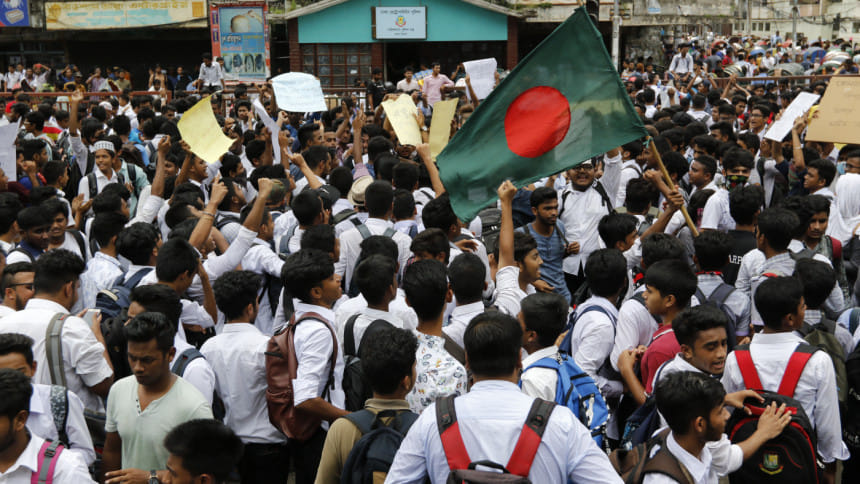
"The guestroom culture is a process through which students in the gonoroom are disciplined," said Mahfuz Rahman*, a resident of Sir A F Rahman Hall of Dhaka University, "If you see your senior, you should raise your hand in greeting and say your name. But the hand cannot be held tightly or shaken. Besides, saying salam is prohibited in many places including canteens, washrooms, newspaper rooms, reading rooms, etc. as per the rules. If the first-year students miss the salam, they'd have to account for it later at night in the form of various punishments. In addition to verbal abuse, allegations of slapping have also been made several times. Second-year students forbid the freshers to eat in their hall canteens as well."
Ragging and bullying by corrupt political personnel are often overlooked by the university authority. The entire system, starting from hall administration to living on campus, is influenced by the political parties at every step. While some students are forced to join these political parties, others often become a part of these parties to get a taste of the power that comes with it.
"The sexual harassment cell is filled with faculty members often resorting to victim blaming when it comes to complains against ones with political affiliations," said Adrita Kabir, a student at the Department of Anthropology of Jahangirnagar University. "Starting from filing a complaint to getting a verdict, the entire process is extremely tedious and exhausting. Ragging is treated much differently when they're caused by the ones with political affiliations. The gonoroom and guestroom culture is prevalent to this day."
The collision between different political groups or different factions of the same political group also disrupts the environment of the university, which has been a recurring event in public universities.
"There are 11 political groups for 11 bogies. Peace is never an option when there are 11 groups hence, they fight among themselves constantly," said Anannya Masrur*, a resident of Deshnetri Begum Khaleda Zia Hall of Chittagong University. "Sometimes the students, after an incident, cut the pipes of the shuttle train so that the connection between the city and the campus is severed. People from the city can't visit us nor can we go to them. The only way we can visit the city then is by local buses which is a hassle. The students who are not part of these groups shouldn't have to suffer for the actions of these political groups."
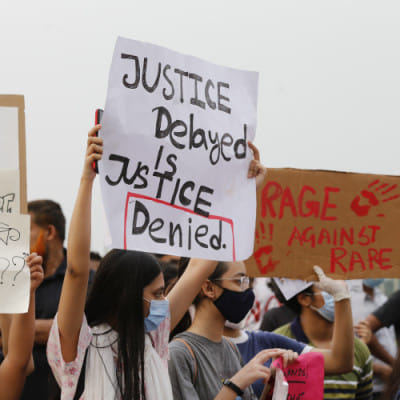
However, it's not all bad. While the power dynamics within universities often lead to savoury incidences, political organisations do take steps to assist students on campus by providing services.
"In the present context, we only see student politics being presented negatively in the media. But we engage in many student-friendly activities as well," said Badhan Dev, Deputy Secretary of BCL of Jagannath Hall branch of Dhaka University, "In the admission test this year, many active groups tried to help the students with the resources they had. I know of a person who did not know that he had to draw figures in the Cha-unit test so naturally, he didn't bring any pencils, boards, erasers etc. and so we managed to take him to Science Lab and buy him the necessary equipment. Student politics has a role in maintaining quality meal supplies as well. The true spirit of student politics lies in ensuring the rights of the students."hj
"We are at this point in time, working for student freedom," explained Adnan Aziz Chowdhury, General Secretary of Bangladesh Students Union, Dhaka University. "We have actively continued to demand the repeal of DSA and resist DPA. We have held movements on this and even offline classes. We have also held protests against the privatisation of education and towards not adding VAT to education."
Regardless of the weight and balance of positives and negatives of student politics on campus, politically inclined student bodies are often the key negotiators with the authority and the only credible student body representative in fixing issues around the campus. While it's easy to colour them all in the same shade and ask for outright bans on student politics, the university authorities need to identify the problems created by these groups and how the general student suffers because of a handful of miscreants. Only then can the same spirit of student politics that earned us our independence sustain in taking our country to the next stage.
*Names have been changed upon request
Azra Humayra is a Journalism major and loves French New Wave films. Send her e-mails at: [email protected]
Remind Ifti to be quieter at [email protected]

 For all latest news, follow The Daily Star's Google News channel.
For all latest news, follow The Daily Star's Google News channel. 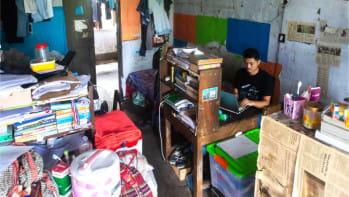




Comments